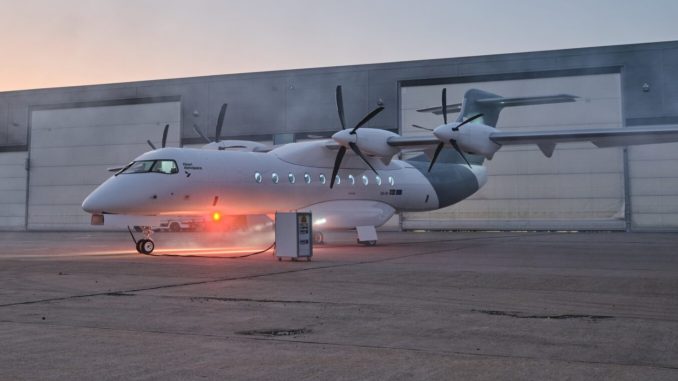
Heart Aerospace, the Swedish hybrid-electric aircraft manufacturer, today unveils its first full-scale demonstrator aircraft, the Heart X1. Built almost entirely in-house at Heart’s Gothenburg facilities, “the demonstrator reflects the company’s strategy to simultaneously develop both the design and production processes,” said the company in a press statement.
“Our industry is approaching a 30-year innovation cycle, and we have less than 25 years to decarbonize aviation. We need to develop new methods to get net zero aerospace technologies to market faster,” said Anders Forslund, co-founder and CEO of Heart Aerospace. “It is a testament to the ingenuity and dedication of our team that we’re able to roll out a 30-seat aircraft demonstrator with a brand-new propulsion system, largely inhouse, in less than two years. “
With a 32-meter wingspan, the demonstrator, named Heart Experimental 1 (Heart X1), will serve as a platform for testing and development of Heart’s ES-30 aircraft. Initially, the HX-1 will be used for ground-based testing, focusing on charging operations, taxiing, and turnaround procedures. It is scheduled to undertake a fully electric first flight in the second quarter of 2025. In preparation for this flight, Heart will over the coming months, test critical systems by running hardware tests both on and off the airplane.
Development of the Heart X1 has been funded in part by grants provided by the Swedish Innovation Agency, Vinnova, highlighting the essential collaboration between government and industry that is needed to bring new aviation technologies to market.
“Developing innovative net zero aerospace technologies demands a revolution in product development and manufacturing, much like what we’ve witnessed in the automotive and space industries,” said Ben Stabler, Chief Technology Officer at Heart Aerospace.
Heart is now focused on creating an aircraft manufacturing process “that leans into the latest technologies in composite manufacturing and product lifecycle management, building a data-driven assembly line with high repeatability, automation and non-destructive inspection. Heart’s next step in developing the ES-30 is the building of a pre-production prototype, the Heart X2, which will further mature the design and production methods based on lessons learned from the Heart X1.
“The Heart X2 is scheduled for a hybrid-electric flight in 2026 and will demonstrate the company’s Independent Hybrid propulsion system. In August, Heart Aerospace was selected for a USD4.1 million grant by the Federal Aviation Administration’s (FAA) Fuelling Aviation’s Sustainable Transition (FAST) program to develop the management system for the hybrid-electric propulsion.
“The ES-30 is a regional hybrid-electric airplane with a standard seating capacity of 30 passengers, which promises to deliver unparalleled sustainability and efficiency on short-haul routes. With an electric zero-emission range of 200 kilometres and an extended hybrid range of 400 kilometres.
The company also announced today that in collaboration with airlines Braathens Regional Airlines, SAS, and airport operator Swedavia it has completed ground support procedure tests for electric aircraft in a push to bring more eco-friendly air travel closer to reality.
The tests were conducted as part of the Swedish research project ELISE, which brings together technology companies with airlines and airports to foster the development of electric aviation infrastructure in Sweden. This phase of the ELISE project focused on creating a full-scale demonstrator of Heart’s regional ES-30 airplane for the testing of ground handling procedures.
Malaysia-based AirAsia, the fourth largest airline in Asia, has joined Heart Aerospace’s Industry Advisory Board. The Industry Advisory Board consists of leading airlines, leasing companies, and airports worldwide.
Fore more information
https://heartaerospace.com/newsroom/heart-aerospace-unveils-first-full-scale-demonstrator-for-30-seat-hybrid-electric-airplane/

